#Jacobean Age
Explore tagged Tumblr posts
Text
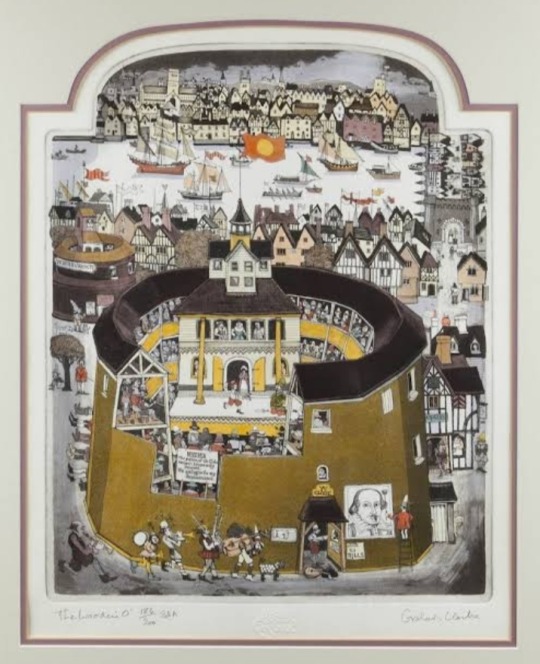
Shakespeare's Globe Theatre.
The story of Globe Theatre started with William Shakespeare's acting company, Lord Chamberlain's Men.
William Shakespeare (baptized 26 April 1564 – 23 April 1616) was a part-owner or sharer in the company, as well as an actor and resident playwright.
From its inception in 1594 AD, Lord Chamberlain's Men performed at Theatre, a playhouse located in Shoreditch.
However, by 1598, their patrons, including Earl of Southampton, had fallen out of favour with the Queen.
Theatre's landlord, Giles Alleyn, had intentions to cancel the company's lease and tear the building down.
While Alleyn did own the land, he did not own the materials with which the theatre had been built.
So, on 28 December 1598, after leasing a new site in Southwark, Cuthbert and Richard Burbage led the rest of the company of actors, sharers, and volunteers in taking the building down, timber by timber, loading it on to barges, and making their way across Thames.
Working together, the actors built the new theatre as quickly as they could.
The ground on the new site was marshy and prone to flooding, but foundations were built by digging trenches, filling them with limestone, constructing brick walls above stone, and then raising wooden beams on top of that.
A funnel caught rainwater and drained it into ditch surrounding the theatre and down into Thames.
The theatre was 30m in diameter and had 20 sides, giving it its perceived circular shape.
Structure was similar to that of their old theatre, as well as that of the neighbouring bear garden.
The rectangular stage, at 5ft high, projected halfway into the yard and circular galleries.
Pillars were painted to look like Italian marble, sky painted midnight blue, and images of gods overlooked balcony. It could hold up to 3,000 people.
By May 1599, the new theatre was ready to be opened.
Burbage named it Globe after the figure of Hercules carrying the globe on his back — for in like manner, the actors carried Globe's framework on their backs across Thames.
A flag of Hercules with globe was raised above theatre with Latin motto: 'totus mundus agit histrionem' ('all the world's a playhouse').
Shakespeare's plays that were performed there early on included:
Henry V, Julius Caesar, As You Like It, Hamlet, Measure for Measure, Othello, King Lear, Macbeth, and Antony and Cleopatra.
Here, the Lord Chamberlain's Men enjoyed much success and gained the patronage of King James I in 1603, subsequently becoming The King's Men.
During a fateful performance of Henry VIII on 29 June 1613, a cannon announcing the unexpected arrival of the king at the end of Act 1 set fire to the thatched roof, and within an hour, the Globe burned to ground.
Everyone escaped safely, save for one man whose breeches reportedly caught fire. Two different songs had been written about it by the next day.
Globe was rebuilt by February 1614. The company could then afford to decorate it extravagantly, and it had a tiled roof instead of thatched.
However, by this point, Shakespeare's influence had lessened. He was spending more and more time back in Stratford-upon-Avon.
Disaster struck again in 1642 when the Parliament ordered the closure of London theatres.
In 1644-45, Globe was destroyed and the land sold for building.
In 1970, American actor and director, Samuel Wanamaker CBE (born Wattenmacker; 14 June 1919 – 18 December 1993), set up the Shakespeare's Globe Trust to pursue his dream of reconstructing the original Globe Theatre.
For what would be almost the next 30 years, he and his team worked and fought to obtain the permissions, funds, and research necessary for a project of this scope.
Historians, scholars and architects all worked together in their efforts to build the Globe in the same way Lord Chamberlain's Men did, down to the green oak pillars and thatched roof.
Their work and dreams were fulfilled when the new Globe Theatre opened in 1997, one street away from where original stood.
Globe stands today as a living monument to Shakespeare, greatest English playwright, home to productions of his plays and many other new ones every season.
#William Shakespeare#Globe Theatre#Elizabethan Age#Jacobean Age#British theatre#English Renaissance#Early Modern Period#actor#playwright#writer#Lord Chamberlain's Men#Queen Elizabeth I#Giles Alleyn#1500s#16th century#King James I#The King's Men#1600s#17th century#Samuel Wanamaker#Shakespeare's Globe Trust#theatres#plays
6 notes
·
View notes
Text
god i absolutely hate when characters in period dramas have perfect hair and flawless skin and white teeth and a full face of makeup at all times like bitch it is 1789 there is no maybelline only consumption
#just watched apostle#movies#television#tv#period drama#victorian#georgian#jacobean#middle ages#period movies#period setting#beauty standards#impossible beauty standards#maybelline#consumption#shitpost#body posititivity
83 notes
·
View notes
Text
Anonymous asked: What are some of your favorite antique things to collect? Do you have any especially favorite finds?
Strawpage/tendermiasma
That's hard... I love furniture, it's so neat to see how they shaped and reflected trends and values and just the pure craftsmanship is so wonderful. My favorite styles hover around the 17th and 18th centuries-- Jacobean, George III, Federal/Hepplewhite/Sheridan. There's something about the crispness of the detailing of the last four that makes an ornamented piece feel so light and airy. I love Jacobean because every piece looks like it was hauled out of a fire, the dark patina is so rich. I don't actually own any originals from these periods (yet!!!) but fashion is a flat circle and Jacobean had a revival in the late 19th and a couple decades into the 20th century. I have a court cabinet from probably around the 1930s that I found here in Austin that was a part of this revival and you can see the Jacobean influence also carries a secondary Arts and Crafts influence that the US was on the tail end of. The engraving on the panels are a little bit flatter than the traditionally extremely 3D Jacobean carving, and that's what Arts and Crafts brought. They kept the dark patina look and I think it's interesting to think about how much lighter actual Jacobean furniture might have been during its time, and that we're choosing to imitate its aged look as part of its original intent-- sort of like how we thought Roman statues started out white when they were actually originally brightly painted, but we choose to make them white in most of our casual references. Regardless the charred finish looks amazing against light colored walls. It feels contemplative. Welsh 18th century design also has that quality although more pared-down but still warm and welcoming somehow. I love it.
Back to Georgian/Sheridan/Hepplewhite/Federal though, also don't actually own any from that time either, although I have been heavilyyyyyyy eyeing a credenza from one of my favorite antique dealers in Austin who randomly has some incredible pieces. I could't buy it responsibly but they're all free right there for me to study and admire. Sheridan and Hepplewhite are super similar and a good way to tell them apart is the feet. If they're tapered little unadorned pegs, it's probably Hepplewhite, and if they have a ball or box on the end or have some other angular detailing, it's probably Sheridan. THOSE styles came back around almost 200 years later in the woodwork of midcentury modern which I think is so neat. You can also help yourself date a piece with other little things, like screws. There was a period in the early-mid 1800s where screws had machine-made threads while their heads were still cut by hand with a hacksaw; the machinery for cutting screwheads came later. Philips screws weren't widely used until the 1940s so that's another possible way to tell. However you have to be careful because a lot of furniture gets repaired and modern hardware is usually used, so it's good to hunt around on it for signs of the original hardware. You can also tell whether hardware is new or possibly original by the amount of patina built up around the hardware. That's hard to fake.
I got lost again. I also love looking at pottery and dishware because there's so much information and history in its marks. It's always such a fun little forensics game to look at its stamps and writings and symbols on the bottom to track where it's been, who made it, is it a forgery of a well-known artisan? That happened to me really recently when I found a Meissen tea set at a thrift store and it turns out I believe I have one actual Meissen cup in there from mid 1800s. The only way I could figure it out it was genuine and also its general date was because of its imperfections, which is pretty cool. Meissen had a specific way of marking B-grade dishware that they only used during certain time periods, and thankfully there's document of it, and my piece carried it. I don't care if she's not A-grade, she's beautiful and I'm a sucker for blue and white china.
I could talk a lot more but I'm just rambling at this point so feel free to ask more. I love it all so much. I've had a great time learning so much more than I bargained for with every new piece I find. I'm still mourning the Austin Antique Mall closure that happened last May but thankfully there's another great one in Round Rock and I should go back next month.

The smoking-gun wheel marks for the date and authenticity of the Meissen cup

My Jacobean-revival court cabinet from probably the 1930s

In her natural habitat. I built the fake fireplace! None of the existing ones were Georgian enough for me lol
The coffee table is I believe late 1930s and the chair is a 1960s wingback that got recovered in probably the 90s and I want to get it recovered again when I can. I'm at capacity since I'm in a 1-bedroom apartment and my primary goal is a well-designed space but when I can get an office it's going to be so over
54 notes
·
View notes
Text
I was talking to my students and then some family members about how the death of Elizabeth I and succession of James was necessarily an occasion of upheaval, even when it wasn't necessarily violent or flirting with treason or whatever. For one, the death of a monarch that will lead to a new dynasty (even a related one!) is not quite the same as a familiar figure inheriting the country's rule from their parent or grandparent. It's usually a bigger change, with dynamics of loyalties and affiliations shifting around—that's part of the reason Elizabeth delayed acknowledging James as her heir.
Typically, you'd see courtiers etc deserting a dying monarch in order to signal their loyalty to the new monarch, even if the old one wasn't actually dead yet. Elizabeth's reluctance to share royal power was fundamental to her reign and her public image, so it's not at all surprising that she would be loath to encourage that kind of desertion in any particular direction.
Of course, another thing that complicates the Elizabeth -> James succession is that she had reigned for a long time (44 years iirc). By the time she was dying, a good number of English people had few personal memories of life under any other monarch, and those who did would remember the abrupt and unstable reigns of her predecessors, Edward and Mary. So James's accession came with uncertainty about what exactly it would entail, and a lot of late Elizabethan/early Jacobean drama in English is very concerned with questions of what obligations the governed owe to their monarchs (obedience? loyalty? are those always the same thing?), but also what obligations monarchs themselves have to their people.
This seemed especially pertinent to Lear, in which multiple characters defy capricious orders from a monarch or other authority out of loyalty: Kent challenges Lear and is banished, so skulks around in disguise to continue serving him, Edgar also skulks around in disguise after Gloucester renounces him and ends up offering what comfort he can to his father, and Cordelia returns to Britain with the French army in her ultimately futile attempt to help Lear. Meanwhile, Lear loses everything, is driven to take shelter in a peasant hovel, and starts to contemplate how his own failures as a king resulted in, well, peasant hovels.
Anyway, now I'm thinking about what a wild figure Elros must have been as, specifically, a monarch to the Númenóreans. He lived for five hundred years. Even his own children (also half-Elves! sort of!) and other descendants who benefited from his lifespan didn't live as long, and most Númenóreans during his earlier reign wouldn't have come near to it. Undoubtedly there were Elves who had known Elros in the First Age who were baffled at him choosing mortality and DEATH, and meanwhile on Númenor, there are all these people living out their extended lifespans under the reign of a half-Elf king who was ruling their people at their birth and would still be ruling after they died of old age. We know Elros retained his half-Elvish characteristics as well, so they've got this visibly Elvish, barely-aging, eternal king who looks like Lúthien as part of the fabric of life for centuries.
Yes, he's literally the first king—but for a lot of earlier Númenóreans, he's also the only king they will ever know. It takes him an incredibly long time to weary of the world as other mortals do. By the time Elros finally gets weary of Arda, and willingly lays down his life and passes to the unknown fate of mortals, Tar-Amandil is stepping into some very big shoes.
#everything is about númenóreans if you believe strongly enough :)#anghraine babbles#long post#elizabeth i#james vi#anghraine's headcanons#legendarium blogging#legendarium fanwank#history blogging#númenórë#elros tar minyatur#king lear#william shakespeare#early modern blogging#peredhil#i was just thinking about how much i love elros headcanons that aren't entirely rooted in his choice of a veryyyyyyy long delayed mortality#because i do see them now and again!#and then got to thinking about how very long it took for mortal world-weariness to catch up with him#and how weird it would be even accounting for adjusted númenórean lifespans (esp if you assume that it wasn't an instant switch#but that 'númenóreanness' took time to really sink into the population as a whole—jrrt say they 'became' barely distinguishable#from elves in appearance and mental powers - not that they were immediately transformed or w/e#so it's possible that it was more incremental—and we do know that the lifespan differences between elrosians and other númenóreans#persisted long after elros's time even though it eventually disappeared)#add in wonky half-elf aging and he must have seemed as functionally eternal as elrond to a whole lot of númenóreans#anyway now i want to know what the late elrosian theatrical scene was like
72 notes
·
View notes
Text
“Don’t waste your time with him.” PT2
(Rivals) Rupert Campbell-Black x Declan O’Hara x Reader
Suggestion by my sweet heart anon 🫶🏽 / Your uncle, Freddie Jones, introduces you to his new business partners, and you end up wishing he didn’t…
18+ FANFIC / SMUT, angsty, all the love triangle goodness. Direct continuation of PT1! This is not the end 💋 Reader character aged at 21. Enjoy! 🥰🫶🏽

The refulgent, white morning sun crept in through the dusty blinds of the Jones’ guest room. The four-poster bed was comprised of Jacobean oak, and embellished in a putrid oche bedspread. “Good mornin’, sweet’art.” Freddie whispered, prising open the bedroom door and suppressing a snigger at your just-awake appearance. Your mountain of hazelnut hair was tangled, and sleep crusted in the corner of your eyes. “Morning.” You groan wincing as your uncle twists open the blinds, releasing the blinding sunlight into the bedroom. “I just wanted to have a word.” He spoke softly, sitting on the edge of your bed as you shuffle to rest on your elbows. “I noticed Rupert and Declan taking an interest in ya’ yesterday. I know you’re a good girl n’ all that, but just be careful. I don’t wanna see you gettin’ hurt. They’re both popping’ over later to go over some expenses, just so ya’ know .” Freddie speaks calmly, rubbing his hand on your shoulder and shooting you a wry smile. Without responding, you nod and wait for him to exit the room, leaving you in a pile of duvets.
When you had sufficiently washed your thick sleep from your body, you trudged down the stairs — giant curled ringlets of hair falling down your shoulders and dressed in a soft white blouse adorned in intricate in aquamarine flowers, neckline exposing an amount of cleavage that would make your aunt Valerie seethe with embarrassment, and a matching blue corduroy skirt, legs bare and shaven. Tiptoeing into the kitchen, you just about manage to pour yourself a glass of orange juice before noticing your uncle Freddie sat at the table, brows furrowed and eyes scanning a piece of paper, Rupert on his left, Declan on his right. “Oh, hello angel.” Rupert spoke before Freddie could, using his leather brogue to pull out the chair next to him.
Taking a seat beside him and slamming your glass onto the table, Declan looked up at you, smiling awkwardly in a way that made his moustache curl pleasantly. “Your uncle is going through expenses. Very boring. Cigarette?” Rupert muttered, offering you a cigarette. Graciously, you accepted and allowed the sculpted man to light it. Taking an elongated drag, you sat back in your chair and attempted to disregard the utterly tedious chat of men. “…Right, Declan, let me show you.” You managed to hear as your ears attuned, watching as your uncle led Declan O’Hara out of the room.
Unwelcomely, your mind returned to the last time you and Rupert Campbell-Black were left alone. His thumb in your mouth, running soft laps around your tongue. The primal look of desire in his eyes. The burning heat in your thighs. “Terribly sorry about the last time I saw you.” He spoke gently, eyes affixed firmly on the inebriating sight of your cleavage. “Are you saying that because you mean it, or because Freddie told you to?” You questioned, puffing on your cigarette and straightening out your blouse. “Freddie told me to. I’m afraid the old boy caught us. I have been firmly warned to stay away.” He chuckles as he speaks, gaze following you as you bring your cigarette to your lips. “And are you going to?” You ask. “Oh darling, where’s the fun in doing what you’re told?” Rupert replies, smirk painted across his lips and his face inching closer towards you. Clasping his fingers through your tangled curls, Rupert kissed you, gently at first, but subsequently growing furiously in passion. His laboured breathing reverberated against your mouth as his hand rested on your thigh, snaking slowly to the clothed heat of your cunt. “Fuck, I can feel how wet you are already.” He breathlessly spoke. “Feel me properly.” You muttered, and barely finished before Rupert was parting your pants to the side, rubbing his finger over your swollen clit and promptly entering you with ease. Simultaneously, you gasped — him in delight, you in shock. “You’re so tight.” He reaffirmed, lust overcoming his body in violent waves.
Freddie and Declan’s re-entrance to the kitchen cut the tension, like someone snipping at an outstretched elastic band, you both sprung back into reality. Rupert frantically removed his finger, skin itching with irritation. “Whiskey, anybody?” You huffed, and jumped out of your seat. Rupert stayed where he was, turned towards your empty seat, and closed his eyes momentarily in exasperation. “Yes. Let’s. There’s a nice bottle in the attic larder, I’ll ask Val to get it.” Freddie chuckled in his usual friendly way. “Oh, don’t bother her. I’ll get it.” You beam, and hurriedly exit the kitchen and make your way to the downstairs attic.
Shuddering as you fought your way through thick sheets of cob webs, you opened the larder door down in the attic, scanning for whiskey as slow as you possibly could. Your heartbeat thumped melodiously as you thought about Rupert — there was something about those cerulean eyes that made you weak at the knees. “I can’t stop thinkin’ about ‘ya.” A soft, Irish voice spoke from behind you. Jumping slightly, you turn on your heels and become face to face with Declan. “What are you doing? Freddie will know you’ve followed me.” You chastise. “Don’t care. Do ya’ know how fuckin’ crazy it drives me to see Rupert lookin’ atcha like that?” He grunts, backing you against the cold brick wall. At least he thought he was just looking, you thought to yourself. His sheer brazenness sent shivers down your spine as he kept his arm outstretched by your head, keeping you enclosed.
“Oh yeah? Does it piss you off?” You goad, and see the corner of Declan’s lips twitching with fury. “Yes, it fuckin’ does. You have no idea what you do to me, girl. Sittin’ there with your tits on show.” He spits, pulling at the neckline of your blouse, exposing your perky tits held up by the most spectacular neon pink bra. The carnal sigh that left his mouth made you quiver — and his chocolate orbs washing over you made you want to kneel before him in a sacrilegious way. “I want to do things to you that Maud couldn’t have dreamed of.” You vocalise, touching a rather vulnerable nerve slightly. Declan’s body rippled, he wasn’t quite sure how to react. “Oh yeah?” He manages, but was quite disrupted by Valerie’s presence at the larder. “What on Earth are you doing?” Her squealing voice grated through you. Pulling your blouse swiftly back up over your bra, you wriggled from under Declan’s arm and pulled the first bottle from the cooler that you could reach.
“Sorry, Auntie Val. I’m so sorry.” You howled, speeding out of the room and suppressing an emergence of embarrassed tears. Declan, similarly ashamed, straightened his beige shirt and smiled sheepishly towards the tiny blonde. Valerie pointed a finger at him, indigo-painted fingernail almost touching the tip of his nose. “I know Fred-Fred has warned you and Rupert about staying away from our niece. I don’t think he’d be pleased to see… whatever this is. You should be ashamed of yourself, Mr O’Hara.”
-
Banishing yourself to your bedroom as their meeting droned on downstairs, you plunged your head into your pillow, sobbing silently to yourself. You didn’t know how or why these two men were having such a great effect on you, but your entanglements have to stop. Don’t waste your time on them.
#rivals#rivals fanfic#rivals fanfiction#rivals disney+#rivals disney#rupert campbell black fanfic#rupert campbell black x reader#rupert campbell black#rupert campbell-black#alex hassell#declan o’hara x reader#declan o hara#declan o’hara#declan o’hara fanfic#aidan turner#freddie jones
149 notes
·
View notes
Text
just walked past a group of maybe 50-60 people tops outside chuck schumer's prospect park west place but they were across the street, in prospect park's sidewalk, and i walked past a bunch of cops just chilling and shooting the shit in front of the building and even just across the street the chanting was at a completely tolerable (pleasant even) volume level, im certain it cannot possibly reach whoever is inside this huge gilded age 19th century jacobean stone fortress, which likely isn't even schumer. is it mean to say it was kind of embarrassing. like break in or something
25 notes
·
View notes
Text

Foxley Church - one of the few churches in the country with an unknown dedication - and the usual patched history of building and adding. Probably 12th century origin, the north aisle extended in the later Middle Ages, a 17th century tower, an 18th century porch and doorway, Jacobean communion rail, an early 20th century restoration, a gorgeous Art Nouveau stained glass window. Out in the countryside, ancient and silent.
42 notes
·
View notes
Text
THIS DAY IN GAY HISTORY
based on: The White Crane Institute's 'Gay Wisdom', Gay Birthdays, Gay For Today, Famous GLBT, glbt-Gay Encylopedia, Today in Gay History, Wikipedia, and more … January 22



1561 – On this date, the English statesmen, essayist and philosopher Sir Francis Bacon was born in London (d.1626). His influence over the James I, who held Bacon in high favor, inspired resentment or apprehension in many of his peers. He is best known for his philosophical works concerning the acquisition of knowledge and the general "scientific method."
He was also extremely fond of men. As the British scholar Rictor Norton points out that Bacon did not marry until the late age of forty-eight, and that contemporary figures, such as John Aubrey, related that Bacon was by preference homosexual. Aubrey noted "He was a Pederast. His Ganimeds and Favourites tooke Bribes". He was known for his preference for the "young Welsh serving-men" who were in his employ and who Bacon became a patron to. Rictor points out most a "young Tobie Matthew, who was left only a ring to the value of £30, but who had become Sir Tobie through Bacon's efforts, and who was well able to care for himself." Tobie was the inspiration for one of Bacon's most famous essays, "Of Friendship."
Several other authors also believe that despite his marriage Bacon was primarily attracted to the same sex. Professor Forker, for example, has explored the "historically documentable sexual preferences" of both King James and Bacon —and concluded they were both oriented to "masculine love", a contemporary term that "seems to have been used exclusively to refer to the sexual preference of men for members of their own gender." The Jacobean antiquarian, Sir Simonds D'Ewes even implied there had been a question of bringing Bacon to trial for buggery.
Indeed, evidence of Bacon's fondness for "red-cheeked lads from Wales" survives in the form of a letter written by Bacon's own mother, in which she complains about the long list of "servants and envoys" who find their way to his bed. She refers to a gay Spanish envoy as "that bloody Perez and bed companion of my son."
Bacon was knighted in 1603, and created both the Baron Verulam in 1618, and the Viscount St Alban in 1621; as he died without heirs both peerages became extinct upon his death. He famously died of pneumonia contracted while studying the effects of freezing on the preservation of meat.


1788 – Romantic poet George Gordon, Lord Byron was born in London (d.1824). It's funny how Byron comes down to us as the über-heterosexual romantic, but the evidence of his deep same-sex love is very clear (if still denied by homophobic historians).While he was still a child, Lord Grey, a suitor of his mother's, made sexual advances to Byron. Although Byron was a very self-centered individual, it is probable that like most children, he would have been deeply disturbed by these sexual advances. His extreme reaction to seeing his mother flirting outrageously with Lord Grey after the incident suggests this; he did not tell her of Gray's conduct toward him, he simply refused to speak to him again and ignored his mother's commands to be reconciled.
Byron's later proclivity for, and experimentation in, bisexuality may be a result of his being sexually imprinted by both genders at an early age. Leslie Marchand, one of Byron's biographers, controversially theorizes that Lord Grey's advances prompted Byron's later sexual liaisons with young men at Harrow and Cambridge. Another biographer, Fiona MacCarthy, has posited that Byron's true sexual yearnings were for adolescent males.
While at Harrow school, Byron formed a circle of emotional involvements with other Harrow boys, which he recalled with great vividness: "My School friendships were with me passions (for I was always violent)." The most enduring of those was with John FitzGibbon, 2nd Earl of Clare — four years Byron's junior — whom he was to meet unexpectedly many years later in Italy (1821). His nostalgic poems about his Harrow friendships, Childish Recollections (1806), express a prescient "consciousness of sexual differences that may in the end make England untenable to him".
"Ah! Sure some stronger impulse vibrates here, Which whispers friendship will be doubly dear To one, who thus for kindred hearts must roam, And seek abroad, the love denied at home."
While a student at Trinity College, Byron fell deeply in love with a fifteen year old choirboy by the name of John Edleston. About his 'protégé' Byron wrote, "He has been my almost constant associate since October, 1805, when I entered Trinity College. His voice first attracted my attention, his countenance fixed it, and his manners attached me to him for ever." Many years later, upon learning of his friend's death, Byron wrote, "I have heard of a death the other day that shocked me more than any, of one whom I loved more than any, of one whom I loved more than I ever loved a living thing, and one who, I believe, loved me to the last." In his memory Byron composed "Thyrza," a series of elegies, in which he changed the pronouns from masculine to feminine so as not to offend sensibilities.
In later years he described the affair as "a violent, though pure love and passion." This statement, however, needs to be read in the context of hardening public attitudes toward homosexuality in England, and the severe sanctions (including public hanging) against convicted or even suspected offenders. The liaison, on the other hand, may well have been 'pure' out of respect for Edleston's innocence, in contrast to the (probably) more sexually overt relations experienced at Harrow School.From 1809 to 1811, Byron went on the Grand Tour then customary for a young nobleman. The Napoleonic Wars forced him to avoid most of Europe, and he instead turned to the Mediterranean. Correspondence among his circle of Cambridge friends also makes clear that a key motive was the hope of homosexual experience. He was successful in this motive, as evidenced by the subject matter of poems like "Childe Harold's Pilgrimage" and other writings from this period.
Ultimately he was to live abroad to escape the censure of British society, where men could be forgiven for sexual misbehavior only up to a point, one which Byron far surpassed.


1893 – German actor Conrad Veidt was born in Berlin (d.1943). He was best known for his roles in "The Cabinet of Dr. Caligari," and "Casablanca."
A bisexual himself, Veidt also also holds the distinction of starring in the first motion picture on the subject of homosexuality: 1919's "Anders als die Anderen" (Different from the Others) which was written and produced by German sexologist and early gay-rights champion Magnus Hirschfeld. "Anders als die Anderen" was released in a DVD format a few years back and provides an amazing historical document of the times.
Veidt also appears in Christopher Isherwood's "Berlin Stories."

The Man Who Laughs
His makeup for his title role in The Man Who Laughs is said to have been the inspiration for Bob Kane's The Joker, Batman's arch-enemy.
In late 1916, he was examined by the German Army and deemed unfit for service and given a full discharge in January 1917. Veidt then moved to Berlin to pursue his acting career. From 1916 until his death, he appeared in well over 100 films.
In the twenties, he moved to Hollywood and made a few films in the twenties but the advent of talking pictures and his broken English made him return to Germany.
Veidt fervently opposed the Nazi regime, motivating him to emigrate from Germany in 1933 a week after marrying Illona Prager, a Jewish woman. He settled in the United Kingdom, perfected his English and became a British citizen in 1938.
He continued making films in Britain, notably three with director Michael Powell: The Spy in Black (1939), Contraband (1940) and The Thief of Bagdad (1940).
In the 1940s he moved back to Hollywood, California, and starred in a few films, such as Nazi Agent (1942), in which he had a dual role as a Nazi and as the Nazi's twin brother, but his best remembered role was as Major Heinrich Strasser in Casablanca (1942). He found himself invariably playing the very characters he detested.
He died suddenly of a heart attack in 1943 while playing golf in Los Angeles. In 1998, his ashes were interred at the Golders Green Crematorium in London.


1898 – Sergei Eisenstein (d.1948) was a revolutionary Soviet film director and film theorist noted in particular for his silent films Strike, Battleship Potemkin and Oktober. His work vastly influenced early film makers owing to his innovative use of and writings about montage.
Eisenstein was a pioneer in the use of montage, a specific use of film editing. He believed that editing could be used for more than just expounding a scene or moment, through a 'linkage' of related scenes. Eisenstein felt the 'collision' of shots could be used to manipulate the emotions of the audience and create film metaphors.
In his initial films, Eisenstein did not use professional actors. His narratives eschewed individual characters and addressed broad social issues, especially class conflict. He used stock characters, and the roles were filled with untrained people from the appropriate class backgrounds.
Eisenstein's vision of Communism brought him into conflict with officials in the ruling regime of Joseph Stalin. Like a great many Bolshevik artists, Eisenstein envisioned the new society as one which would subsidize the artist totally, freeing them from the confines of bosses and budgets, thus leaving them absolutely free to create.
Eisenstein's popularity and influence in his own land waxed and waned with the success of his films and the passage of time. The Battleship Potemkin (1925) was acclaimed critically worldwide and popular in the Soviet Union. Acknowledged as his masterpiece, The Battleship Potemkin used editing and the rush of images to attain a greater emotional effect. Shot with the immediacy of a newsreel, this story of the naval revolt in Odessa in 1905 produced some of the most celebrated sequences in twentieth-century art: the Odessa steps scene must be the single most quoted, imitated, and parodied sequence in movie history.
youtube
The Odessa Steps sequence (7 mins 21 secs)
But it was mostly his international critical renown which enabled Eisenstein to direct The General Line (aka Old and New), and then Oktober (aka Ten Days That Shook The World) as part of a grand 10th anniversary celebration of the October Revolution of 1917. The critics of the outside world praised them, but at home, Eisenstein's focus in these films brought him under fire within the Soviet film community forcing him to issue public articles of self-criticism and commitments to reform his cinematic visions to conform to socialist realism's increasingly specific doctrines.
Chafing under the constraints of Stalinism, Eisenstein accepted offers to work abroad. Eisenstein returned to the Soviet Union in 1935, where he continued the spiral of falling out of and back into favor with the Stalinist regime. His remaining films - Bezhin Meadow [1937]; Alexander Nevsky [1939]; Ivan the Terrible, Part I [1942]; Ivan the Terrible, Part II: The Boyars' Plot [1946]; and the surviving fragment of Ivan the Terrible, Part III [1947] - were marked with the tensions of the political turmoil in which Eisenstein was embroiled.
Eisenstein's personal life was also chaotic. He married twice in response to political pressure, but his marriages were never consummated. His unexpurgated diaries, published as Immortal Memories, are filled with accounts of his infatuations with many young men, including his assistant, Grigori Alexandrov.
Often his infatuations (as in the case of Alexandrov) were with young heterosexual men, whom he would educate and assist in their careers. His drawings, exhibited during the centenary of his birth, include many illustrations of homosexual activity.
Despite his difficulties with censorship and other problems, Eisenstein created a remarkable legacy. His films reveal his continued commitment to experimentation in form. Alexander Nevsky, his first sound film, contains spectacular scenes, most notably the Battle on the Ice, as well as the incomparably thrilling film score of Sergei Prokofiev.
Ivan the Terrible, an intensely Expressionistic study of political power and corruption, with immense sets, voluminous costumes, and amazingly hyperbolic lighting, represents a contrast to this earlier work. It was not dynamically edited, but relied on extended long takes, in which dialogue, sound effects, and music were crucial. Ivan the Terrible pointed to new operatic possibilities in motion pictures.
From Strike to Ivan, Eisenstein's career always excited controversy - much of his work was either destroyed or confiscated - but he remains one of the most important filmmakers in history, the exemplar of the true intellectual artist.
Eisenstein suffered a hemorrhage and died at the age of 50. An unconfirmed legend in film history states that Russian scientists preserved his brain and it supposedly was much larger than a normal human brain, which the scientists took as a sign of genius.


1942 – Today was the birthday of Mexican director, screenwriter and editor Jaime Humberto Hermosillo (d.2020). Often compared to Spanish director Pedro Almodóvar, Hermosillo's films often explored the hypocrisy of middle-class Mexican values.
He was also openly Gay and has explored such themes in his work. His films include Esmeralda Comes by Night, Forbidden Homework , El Misterio de Los Almendros, and the Gay classic Dona Herlinda and Her Son about a young bachelor doctor who has a love affair with a younger music student, Ramon.

At the time of his death Hermosillo was teaching film-making at the University of Guadalajara and had recently collaborated with his students on several projects. On 13 January 2020, Hermosillo died at the age of 77, 9 days before his 78th birthday.


1969 – Gary Frisch (d.2007) was co-founder of the Gaydar website. He was one of the UK's leading gay businessmen.
Frisch was born in South Africa. He was educated at Boksburg High School and studied computer science at the University of the Witwatersrand in Johannesburg while working for De Beers' industrial diamond division. After graduation, he set up a computer software company, Frisoft Software, which he sold to Q Data (now named Business Connection) in 1994. He was a technical director with Q Data until he left South Africa in 1997.
He moved to the UK in 1997 with his boyfriend, Henry Badenhorst, to set up QSoft Consulting, an information technology consultancy firm. After a friend complained that he was too busy to look for a new boyfriend, they launched the Gaydar internet dating website in November 1999 from their home in Twickenham.
The website rapidly became very popular. There had been gay dating sites before, but they were slow and laborious. Gary developed two features which speeded things up: Who's Online told participants who was actually there, and Instant Messaging made immediate contact and chat possible. After its first year, Gaydar had 78,000 registered members. By 2007, Gaydar had more than 3.5 million users in 23 countries. In the UK, it accounts for more than 72 per cent of gay and lesbian traffic on the internet, with more than 1 million members. The Gaydar brand expanded into other areas: Frisch was chairman of GaydarRadio, a digital radio station founded in 2002.
After Gaydar came the digital radio station GaydarRadio and GaydarGirls. Gary and Henry then bought one of their main rivals, Rainbow Network, held GaydarDays at Alton Towers and sponsored pride events, such as the Sydney Mardi Gras.
So successful has Gaydar been that it has been blamed for a downturn in the numbers of men visiting gay bars, clubs and cruising grounds. Some have also blamed it for a rise in unsafe sex. But its reach is so great that the Terrence Higgins Trust now hosts a chatroom, offering sexual health advice, and many police community safety officers have profiles enabling gay men to report homophobic crimes.
Badenhorst and Frisch's personal partnership broke up in 2006, although they remained business partners.
In 2007, Gary Frisch was found dead below the window of his eighth-floor flat in Wandsworth, South London. A verdict of misadventure was recorded by Dr Paul Knapman, the coroner at the inquest. A pathologist, Dr Peter Wilkins, said raised levels of ketamine were found in Mr Frisch's blood and liver.


2009 – On this date a sociologist at an Iranian university presented a study showing high levels of homosexual experiences among the country's population. Iran has strict laws against sex outside marriage and other sexual acts such as masturbation. Adultery and same-sex acts are punishable by death. Startling new research from sociologist Parvaneh Abdul Maleki found that 24% of Iranian women and 16% of Iranian men have had at least one homosexual experience. 73% of men and 26% of women surveyed said they had masturbated.
Ms. Maleki presented her findings at the Third Conference on Well-being in the Family and the story was reported in the Iranian press, albeit as a report on sexual deviance in need of treatment. The report also revealed that more than 75% of those who grew up in a conservative religious environment have watched pornography, 86% have had a heterosexual relationship outside of marriage and just over 4% have had Gay or Lesbian relationships.
Since Iran's Islamic revolution in 1979, human rights groups claim that between 3,000 and 4,000 people have been executed under Sharia law for the crime of homosexuality. In September the President of Iran admitted in an interview that there may be "a few" Gay people in his country, but attacked homosexuality as destructive to society. In an interview with US current affairs TV program Democracy Now, Mahmoud Ahmadinejad also rejected criticism of the execution of children in Iran.
During a visit to the US in 2007 he said in reply to a question posed about homosexuality during his speech at New York's Columbia University: "In Iran we don't have homosexuals like in your country... In Iran we do not have this phenomenon, I don't know who has told you that we have it." In his TV interview in September he condemned American acceptance of Gay people. "It should be of no pride to American society to say they defend something like this," President Ahmadinejad said. "Just because some people want to get votes, they are willing to overlook every morality."


20 notes
·
View notes
Text
Have you played DAEMONOLOGIE?
By Six Planes Game

Daemonologie is a dark fantasy NSR (New School Revolution) game set in the age of hysterical witch hunts in Jacobean England. Players take the role of members of a secret inquisition outside of the jurisdiction of the Crown, racing against the rising public fear to catch the servants of the Devil before the King's forces start executing the innocent.
28 notes
·
View notes
Text

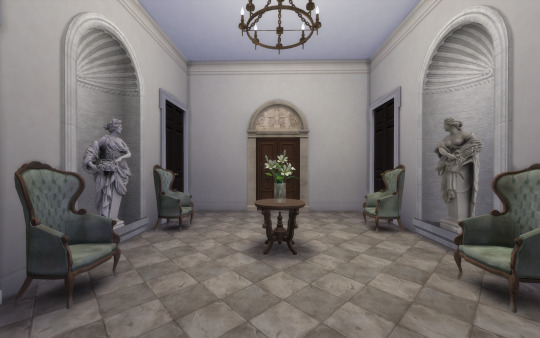
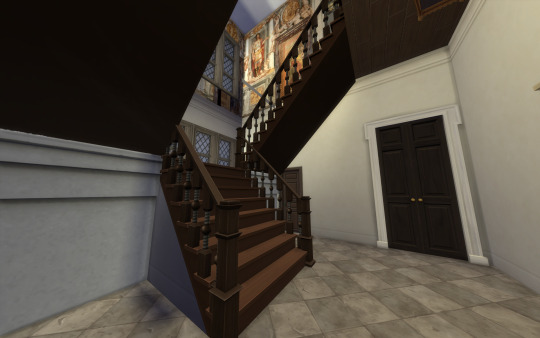
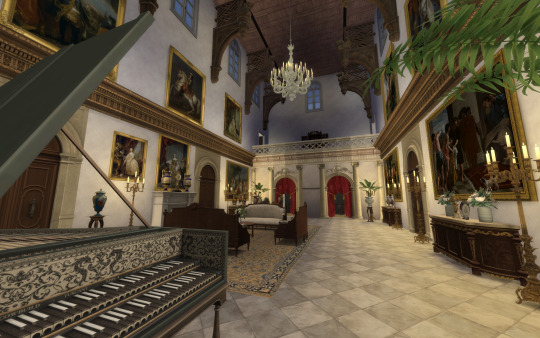



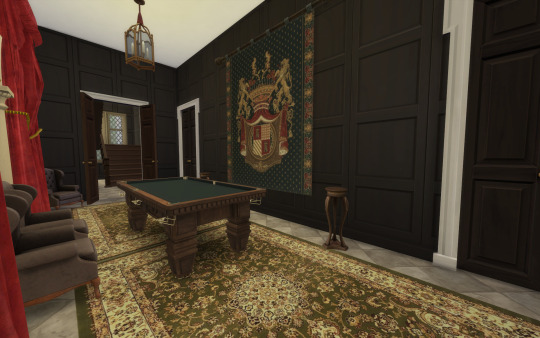
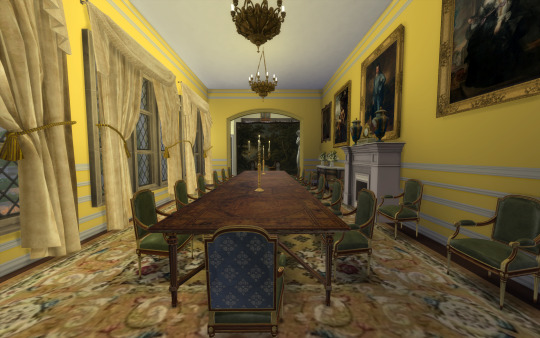
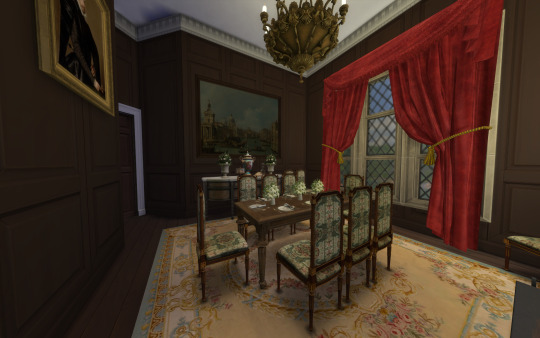
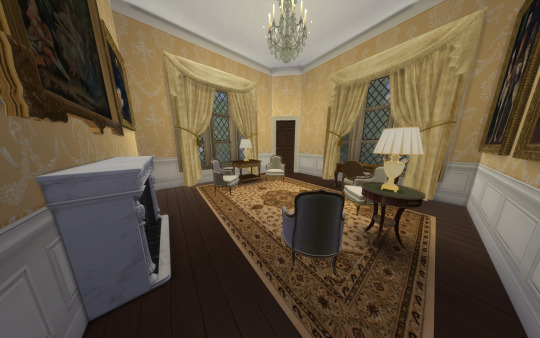
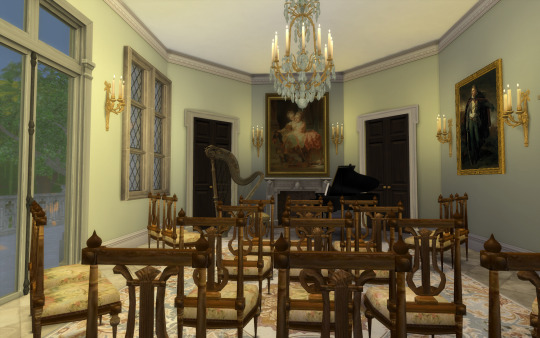

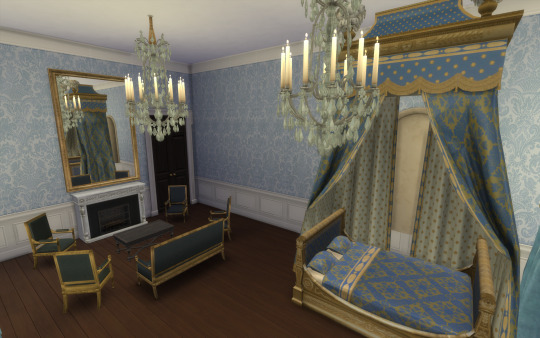

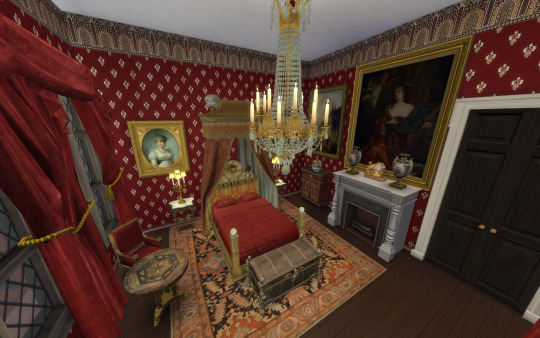

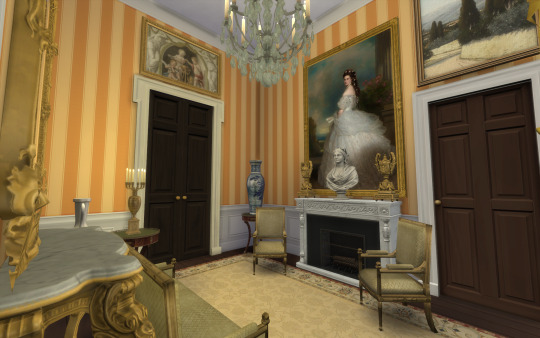

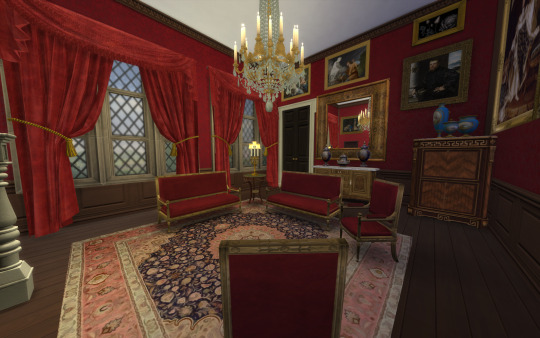

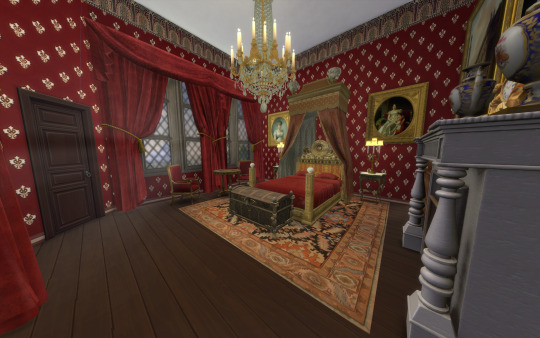
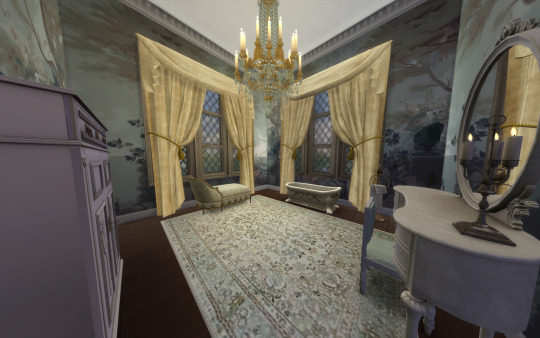


Wollaton Hall, Nottingham
Hi guys!!
I'm sharing Wollaton Hall. This is the 7th building for my English Manors Collection, and I will add many more!
House History: Wollaton Hall was built between 1580 and 1588 for Sir Francis Willoughby and is believed to be designed by the Elizabethan architect, Robert Smythson, who had by then completed Longleat, and was to go on to design Hardwick Hall. The general plan of Wollaton is comparable to these, and was widely adopted for other houses, but the exuberant decoration of Wollaton is distinctive, and it is possible that Willoughby played some part in creating it. The style is an advanced Elizabethan with early Jacobean elements.
Wollaton is a classic prodigy house, "the architectural sensation of its age", though its builder was not a leading courtier and its construction stretched the resources he mainly obtained from coalmining; the original family home was at the bottom of the hill. Though much re-modelled inside, the "startlingly bold" exterior remains largely intact.
The house was unused for about four decades before 1687, following a fire in 1642, and then re-occupied and given the first of several campaigns of re-modelling of the interiors.
The hall remains essentially in its original Elizabethan state, with a "fake hammerbeam" wood ceiling of the 1580s, in fact supported by horizontal beams above, but given large and un-needed hammerbeams for decoration.
In 1881, the house was still owned by the head of the Willoughby family, Digby Willoughby, 9th Baron Middleton, but by then it was "too near the smoke and busy activity of a large manufacturing town... now only removed from the borough by a narrow slip of country", so that the previous head of the family, Henry Willoughby, 8th Baron Middleton, had begun to let the house to tenants and in 1881 it was vacant.
The hall was bought by Nottingham Council in 1925. Estate and personal papers of the Willoughby family were used to create the Middleton collection at the department of Manuscripts and Special Collections, The University of Nottingham. They include the Wollaton Antiphonal and the single manuscript holding the 13th-century post-Arthurian romance Le Roman de Silence.
Nottingham Council opened the hall as a museum in 1926. In 2005 it was closed for a two-year refurbishment and re-opened in April 2007.
More history: https://en.wikipedia.org/wiki/Wollaton_Hall
----------------------------------------------------------------------------------------------------------
This house fits a 50x50 lot and features a great room, a formal dining room and a daily breakfast room, a great library, his and hers bedrooms, 2 royal bedrooms with their formal sitting rooms.
This time I decorated most of the rooms for picture purposes, but as allways, you can make it your own!
Hope you like it.
Be warned: I did not have the floor plan for the 2nd floor. The distribution is based on my own decision.
You will need the usual CC I use: all of Felixandre, The Jim, SYB, Anachrosims, Regal Sims, TGS, The Golden Sanctuary, Cliffou, Dndr recolors, etc.
Please enjoy, comment if you like it and share pictures with me if you use my creations!
Early access: August 15.
DOWNLOAD: https://www.patreon.com/posts/103223415?pr=true





#sims 4 architecture#sims 4 build#sims4#sims4play#sims 4 screenshots#sims4building#sims 4 historical#sims4palace#sims 4 royalty#ts4 download#ts4#ts4 gameplay#ts4 legacy#ts4 simblr#ts4cc#the sims 4#sims 4#my sims#ts4 screenshots#the sims community#ts4 historical#ts4 history challenge#ts4 history cc
47 notes
·
View notes
Text


The Haunted Atlas
Charlton House - Greenwich, London, United Kingdom
51°28′50″N / 0°02′14″E
Former stately home in Greenwich, London, with active haunting phenomena. Now a municipal building, Charlton House has been the site of numerous investigations by paranormal researchers. Some unusual phenomena have been recorded there, including what may be the first "live" apport on film.
Charlton House was built in grand Renaissance style in the early 17th century by Adam Newton, a royal tutor. In 1680, Newton sold the house to Sir William Langhorne, who served as governor of Madras and wanted the house for his retirement. Langhorne lived there until his death in 1715 at age 85. Although he enjoyed women, he never produced an heir. His restless ghost is said to haunt the halls and turn bedroom doorknobs. Another ghost often seen walking on the grounds is that of a servant girl dressed in Jacobean clothing carrying a dead baby in her arms.
Charlton House was turned into a hospital during World War I. One room said by local lore to be the most haunted was left unoccupied until need required that it be opened. The house was severely damaged by bombs during World War II. Repairmen found the mummified body of a child walled in one of the house's chimneys.
The Greenwich Borough Council owns Charlton House, which now serves as a public library and day center. Employees and visitors have reported haunting phenomena, primarily on the third floor, and especially in two rooms known as the Grand Salon and Long Gallery. Other ghosts are an Indian civil servant who likes to pinch the bottoms of women, and phantom rabbits, perhaps due to the fact that a rabbit hutch once was kept in the Long Gallery.
Investigators, including those from the Society for Psychical Research (SPR), the Association for the Scientific Study of Anomalous Phenomena (ASSAP) and the Ghost Club, have held vigils there. Unexplained, explosive noises have been recorded, as well as the sudden movement of objects, which appear to be thrown. Mysterious sighs and vague voices have been heard. Cold spots are felt.
Around the end of 1995, an apport manifested during a taping for a British Broadcasting Corporation (BBC) television show on the paranormal. Participating in the vigil was Maurice Grosse, chairman of the Spontaneous Cases Committee of the SPR, and Les Herbert of the ASSAP. They sat in the Long Gallery with BBC assistant producer Amir Jamal. The room was searched, and the lights were turned off for the vigil. Jamal kept a flashlight in one hand and a camcorder in his other hand.
Sometime after 11 P.M., Grosse, who had closed his eyes, heard a police siren outside, which stopped suddenly. Then a tremendous explosion sounded in the room. Everyone leaped up, and the lights were turned on. In the center of the room was a blue and white teacup, broken into seven pieces that were arranged in a small, near circular fashion, as though someone had laid them out.
No one knew where the cup had come from. The Charlton House staff could not identify the china pattern—the house had only all-white teacups. More puzzling, however, was the manner in which the pieces were neatly arranged on the floor. If the cup had fallen from a height or been thrown, fragments would have been scattered about in wide disarray. Grosse and other investigators attempted to recreate the breakage by throwing teacups of similar size and thickness. They either could not break the cups or succeeded only in smashing them to bits.
The explosive sound was captured on the camcorder footage. An analysis by BBC experts determined that the sound was typical of an explosion, not just of a teacup breaking.
No evidence of hoax was found.
On July 30, 1999, during a vigil by members of the Ghost Club, a loud explosive noise was heard, and a test object, a carved wooden mushroom placed in the rooms by investigators, suddenly flew about 10 feet through the air.
Some investigators have held seances in the haunted rooms and said they made contact with various spirits present.
Text from The Encyclopedia of Ghosts and Spirits, Third Edition by Rosemary Ellen Guiley (Checkmark Books - 2007)
#the haunted atlas#charlton house#greenwich#london#united kingdom#ghosts#spirits#apparitions#haunted locations#hauntings#phantom rabbits
15 notes
·
View notes
Text





On Hogmanay 1720 Prince Charles Edward Stewart was born in Rome.
Prince Charles' childhood was lively and full. By the age of six, he was fluent in reading English, French and Latin, was gaining a firm grasp of music, and he rode and shot with enthusiasm.
Europe became increasingly restless when Emperor Charles VI died in 1740, and tension mounted between Protestant England and Catholic/Jacobean communities in both Scotland and France.
Charles' ambition and desire for military success led him to plan an invasion of England, in order to capture the throne for his father, from George II.
After a period in France following a failed attempt to gain support, Charlie landed in Scotland on 25th July 1745. He gained support from the Highlands and his army successfully fought General John Cape's men. at the Battle of Prestonpans, his army attempted to continue to London. They were forced to retreat back to Scotland, after receiving reports of overwhelming armies prepared to defend the city. Charles did not give up completely and continued to lead his men into battles.
However, after the disastrous defeat at Culloden Moor, Charles was forced to spend the next five months as a hunted man. It is not completely clear how Charles spent these months, although it appears he disguised himself as a 'Mr Sinclair', a ship-wrecked merchant, and later on more famously as a lady, 'Betty Burke'.
In 1748, the war between France and England ended and the English insisted the French exile Charles. He was forced to spend the rest of his life moving around Europe in a range of guises. He had a daughter, by his Mistress, Clementina Willeinshaw, in October 1753, but the relationship ended in 1760 - amid tales of jealousy and violence.
By the age of 45, Charles had few supporters and was excluded from his father's will. (Luckily his younger brother Henry, the main beneficiary, was honourable enough to give Charles all he deserved.)
He married a nineteen-year-old bride in 1772 but, after another break down, forced her into a Convent. From 1783, 'Bonnie Prince Charlie' was ill and was nursed by his daughter until 1788, when he suffered and stroke and died on 31 January, aged 68.
His legend continues despite it mainly being based on only one year in Scotland.
10 notes
·
View notes
Text

Anne of Denmark, 1574–1619
Artist: John de Critz (Flemish, 1551–1642)
Date: circa 1605
Medium: Oil on Panel
Collection: National Maritime Museum, Greenwich, London, England
Anne of Denmark
Anne of Denmark (Danish: Anna; 12 December 1574 – 2 March 1619) was the wife of King James VI and I. She was Queen of Scotland from their marriage on 20 August 1589 and Queen of England and Ireland from the union of the Scottish and English crowns on 24 March 1603 until her death in 1619.
The second daughter of King Frederick II of Denmark and Sophie of Mecklenburg-Güstrow, Anne married James at age 14. They had three children who survived infancy: Henry Frederick, Prince of Wales, who predeceased his parents; Princess Elizabeth, who became Queen of Bohemia; and James's future successor, Charles I. Anne demonstrated an independent streak and a willingness to use factional Scottish politics in her conflicts with James over the custody of Prince Henry and his treatment of her friend Beatrix Ruthven. Anne appears to have loved James at first, but the couple gradually drifted and eventually lived apart, though mutual respect and a degree of affection survived.
In England, Anne shifted her energies from factional politics to patronage of the arts and constructed her own magnificent court, hosting one of the richest cultural salons in Europe. After 1612, she had sustained bouts of ill health and gradually withdrew from the centre of court life. Though she was reported to have been a Protestant at the time of her death, she may have converted to Catholicism at some point in her life.
Some historians have dismissed Anne as a lightweight queen, frivolous and self-indulgent. However, 18th-century writers including Thomas Birch and William Guthrie considered her a woman of "boundless intrigue". Recent reappraisals acknowledge Anne's assertive independence and, in particular, her dynamic significance as a patron of the arts during the Jacobean age.
#portrait#female#john de critz#flemish painter#queen of scotland#queen of england#queen of ireland#european queen#european art#early 17th century#costume#lace and crochet#jewelry#hair ornament#chair#throne#pearls#european nobility
8 notes
·
View notes
Text
I’ve wanted to watch more Roger Corman films for a long time — he’s been a pivotal force in the careers of a lot of directors whose works I enjoy and his impact on some of my favorite silly horror tropes is off the charts — but tonight we did a questionable thematic double feature of Corman’s Masque Of The Red Death (1964) with Visconti’s Death In Venice (1971) and hoo boy… my Vincent Price thirst… is strong…
Some thoughts:
- It’s a delight to have an adaptation that engages with Poe’s use of color and the color palettes of all that highly saturated, artificial, Star Trek TOS-looking costuming is a pleasure after “the Middle Ages were brown and gray” has been the norm for so many years now. The presence of the Red Death is undercut by the liberal use of red in the courtiers’ costuming but the costume/character design fucking rules.
- On the flipside, every single one of these costumes could be dated like a tree trunk slice; they are pure 1964 and they look like if you held a match up to them they’d melt. I would loved to have seen more Bogus Renaissance Italy vibes rather than Bogus Generic Medieval but I get that they were working with what they were working with.
- If I saw this movie in 1964 as a teenager it would have blown my tits right off. Arch, sexy, incredibly nasty Prince Prospero low key holds a virtuous peasant girl hostage in exchange for sparing the lives of her lover AND her father, then proceeds to attempt to seduce her into his philosophy of cynicism, skepticism regarding organized religion, and also Satanism, while his clearly pretty lonesome consort is off doing her own thing with Satan and they have a truly bonkers triangulation with exquisite wife-mistress femslash potential and also there’s a lot of evil bathing and evil dressing??? Also there’s a pretty loosey-goosey adaptation of Hop-Frog but I don’t give a fuck, Hop-Frog (excuse me, Hop-Toad for some reason in this) is my favorite figure from Poe and while the ending of the film is a bit Hays Code-y (just too many people being spared!) him and his lady love getting away clean is always a lovely element. (Even if the choice to cast him with an actual adult little person actor who’s appropriately super charming and scheming and her as an ADR’ed child is: super super weird. It was the 60s, I guess.)
- @allthestoriescantbelies pointed out to me that Jane Asher is also the protagonist of The Stone Tape and damn, girl cannot catch a gothic break, no matter what era she’s in. She’s lovely in this.
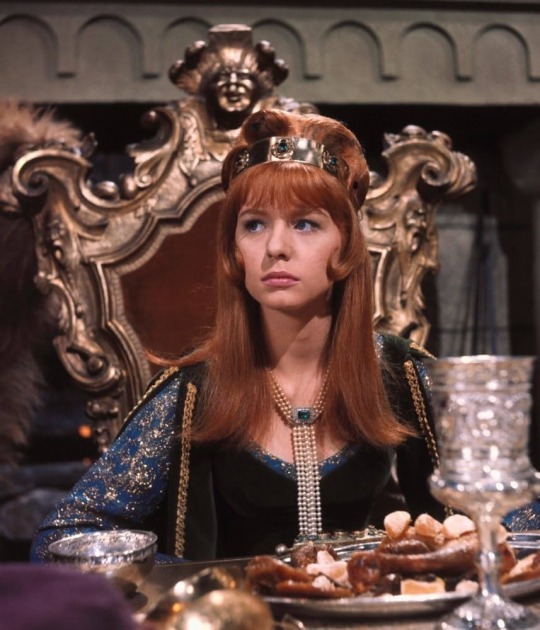
- I want to show this movie on repeat to all historical costume accuracy discoursers.
- I also want a bunch of Jacobean revenge tragedies costumed exactly like this. In some alternate reality where all the incest wouldn’t be a dealbreaker I think Corman could have cleaned the fuck up adapting Webster and Middleton and whatnot. Hell, do Corman’s Hamlet.
- All the courtiers’ debauchery is pretty tame at first — they canoodle fully clothed, impersonate animals, and drink a lot of wine — but when that finale hits, it really hits.
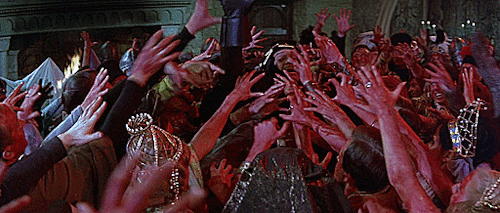
In conclusion I feel like this film gave me an injection of vital villain/heroine essence directly to the bloodstream.
42 notes
·
View notes
Text
Umbrella Pharmaceuticals - Chapter 49
Summary: Alfred Ashford starts secondary school. Alexia Ashford receives psychiatric treatment after attacking her psychologist. Alexander Ashford reveals the CODE: Veronica project to his mother.
I
The pinnacle towered above a complex of stone and brick encircled by a high, thick stone wall. The wall bordered the only road connecting the estate to the London suburbs. A bronze plaque embedded in the stone announced the entrance to King Jacob II College.
Elizabeth bade him farewell on the threshold of the main building. Ailing with age, she barely leaned back to kiss Alfred on the cheek and had to leave after greeting headmaster Leslie Campbell and housemaster James McNamara-Douglas, both members of Jacob's Circle and attached to the respective clans. From that moment on, both men would be responsible for Alfred's care and education for the next five years.
The headmaster led him to his office to explain the social and educational dynamics of the institution. Alfred, now dressed in his frock coat and stiff collar, carried his bulky leather suitcase without complaint and with the housemaster on his back. King Jacob II College, the headmaster began, was part of the Jacobean educational project designed by Veronica Ashford and Rupert Campbell to ensure the political and economic influence of the remnant Stuart lineages in the United Kingdom of Great Britain and imperial possessions. King Jacob II was founded in the late 19th century as the boys' boarding school for the recruitment of the English and foreign elite concentrated in London. At the same time, Queen Anne College was erected as its female counterpart. Due to the success of the project, King Charles I and Queen Mary I colleges were opened in Edinburgh for the Scottish and Irish elite. Because of the geographical division, the funding and governance of the Scottish boarding schools remained in the hands of the Campbells, while the Ashfords took over the governance of the English pair. This separation also had to be respected by the families, which is why Alfred was compulsorily transferred to King Jacob II after preparatory school. And, unsurprisingly, the administration of the four schools rested exclusively with Jacob's Circle. There was no one, not one teacher, who was not an associate or member of the Circle. On the contrary, most of the student body came from a diversity of social and cultural backgrounds, with a handful of foreigners, and a small Jacobin minority. This Jacobin minority was concentrated in King's House, and it was these boys who always served as prefects. Alfred would be housed in a single dormitory in King's House, where he would share residence and communal life with thirty other boys. Finally, because he was Ashford, custom dictated that he was entitled to a couple of exclusive dormitory privileges. Alfred chose a television with VHS and the Atari 2600. He would get the movies and video games.
The course began with the one hundred and fifty students gathering in the auditorium to listen to the headmaster's speech. A giant painting of Veronica Ashford and another of Rupert Campbell hung on the wall, and Alfred felt the pressure. He broke out in a sweat and disguised the movement of his nervous hands by pretending to adjust his trousers. The painting of Veronica Ashford anticipated reading the biography of illustrious pupils like his great-great-grandfather, great-great-grandfather and grandfather, who contributed so much to the civilisational development of Britain. And, ultimately, in an adjoining room for the assembly of the student body with the faculty and school authorities, Alfred read the name inscribed on the wooden panels of Stanley Ashford, Thomas Ashford, Arthur Ashford, Edward Ashford, and Alexander Ashford. His name would be engraved after his father's just as his future son's name would be placed after his own. Alfred felt a knot in his stomach. Victory or death.
As in prep school, a first week of grace was granted for the freshmen to settle in. However, the week took an unexpected turn when the group of five prefects from his house bowed to him and invited him to join their group. Alfred accepted without a second thought. The prefects passed his test on his knowledge of the school and the staff and promised him their selfless protection. Alfred heartily welcomed the initiative as a qualitative improvement on his bitter and lonely experience at Watford. However, he soon discovered that his relationship with the gang was not peer-to-peer, but primus inter pares. He discovered this when Roderick, one of the five boys, brought him another boy to be his fag. Technically, the school had banned fagging last year, but Alfred could enjoy the approval of the prefects to dispose of one secretly. He ordered the boy called Henry to take care of the cleaning of his dormitory and to serve him tea for nothing, because it was Roderick who managed this service. In this way, no one disturbed him with trifles. But there was a second matter. An unexpected and disturbing fact that captured Alfred's imagination and all his attention.
The punishments. A month after the first day of school, Harvey, another prefect, invited him to come to the garret of the house. Alfred followed Harvey to the trapdoor. Before opening the lid, he held out a black Halloween mask simulating a rabbit's head to Alfred.
“Put it on.”
In the garret there were three children, two thirteen years old and one fourteen. The children were frightened by the sight of the monstrous rabbit. The five prefects rounded them up in a circle, and one of them asked the rabbit:
“How do we punish them?”
The rabbit called to one of the prefects to whisper the verdict in his ear. The prefect understood the rabbit's words and carried out his will. Three prefects held the victims while the other two wielded belts.
They knew where and how to strike so as not to leave marks or draw blood. Harvey put the rabbit mask in a hidden box and congratulated the prince on his creativity.
“See you next time.”
At first, he distracted himself by daydreaming and sketching children and prefects in a notebook. One of the teachers caught him but ignored the scene Alfred had drawn: a detailed and realistic depiction of the five prefects beating the three boys with their belts. He got bored with the belts and reimagined the scene from other angles and with other tools. First, he designed simple tools such as scissors, pruning shears, sticks and ropes. Secondly, he traced the shape of bladed weapons and instruments of torture such as the iron lady. And thirdly, he included new victims in the scene. He secretly made a quick sketch of his classmates and housemates and then introduced them into the scene, which constantly changed location and furnishings. In a catacomb, in his room at Ashford Hall, in a cemetery, in a shopping centre or in a laboratory with the Umbrella logo printed on the wall. As the number of locations and their difficulty increased, so did the definition of the bodies, their postures and expressions. He wanted it to be realistic and so he signed up for painting classes instead of marching with the cadets[1]. The painting classes improved his skill, as well as supplanting his abstinence for punishment. He once painted a picture in which he framed the reason he clung to the memory of the first punishment: power of influence, desire for importance and, above all, mitigation of emotional emptiness. The positive emotions of the punishment outweighed the negative emotions of family abandonment and parental absence. If he thought about the punishment, he forgot about other thoughts such as whether his father loved him or whether he was disappointed in him. Alfred wanted to prove his worth to him, but locked up in the boarding school he could think of no way to prove his manhood to him other than by wearing a kilt and killing Englishmen. Fortunately, the anguish didn't last more than two months. Harvey reappeared in his room with the rabbit mask stuffed in a sports bag.
“Let's go.”
Under his guidance, the punishments increased in variety, but habit drove him to seek more and be more reckless. To his face, he insulted fellow housemates for being lower class, was racist towards the only pair of Indians in King's House, beat up a middle-class boy who got too smart with the Stuart, shoved a boy's head down the toilet and forced a pair of freshmen to skinny-dip in the stream that ran through the estate. They lashed out with conservative slogans at the only leftist in the building while burning a picture of Fidel Castro with a lighter. At this point, Alfred's existence was limited to studying and inventing new outrages with which to reaffirm his status and evade the uncomfortable questions raised by the emotional void. A reign of terror in which he gave free rein to his limitless brutality.
In December 1982 Alfred made out with Henry. He had masturbated to a porn magazine that Roderick had smuggled into the study room he shared with him and Harvey. There weren't any girls at his school, so he went to try whoever was closest to hand. The two kissed roughly out of inexperience and without excitement on Alfred's part. In any case, Henry's warmth did him good and he threatened his subordinate to keep their relationship a secret.
“You're an asshole,” Henry replied.
In January 1983 Alfred showed up at the headmaster's office. He left with two letters and a reprimand for having been caught smuggling in a couple of VHS movies and a video game. He had to be subtle if he didn't want to lose his privileges. The Exorcist and Invasion of the Body Snatchers. He watched them with Henry and loved them. Unfortunately, Henry was a lout with Atari’s Adventure.
The first letter was signed by his grandmother. She wrote that his father and sister were well in Antarctica and that she missed him very much. She wanted to hug her grandson again and go on a picnic with him. The second letter was signed George Frederick Benjamin Stanley Owen Ashford-Campbell-Douglas-Stuart from the Soviet Union. He knew who he was: his grandfather's younger brother Edward Ashford. Spurred by morbidity and surprise, he read the second letter.
II
Dear Alfred,
Perhaps you know who I am. We have never met in person, and never will, though you may have seen me in some picture my father forgot to tear up or burn. I will be brief and to the point. I am your great-uncle George and I feel an obligation to warn you about our family and about your future. What you do with this warning, and even with this letter, I leave up to you, but I want to tell you in writing what I know and have experienced.
You were born in 1971, three years after my older brother's death and more than ten years after my father's death. I imagine that Alexander must have spoken highly of both of them, as it is a moral imperative for a son to speak well of his father and grandfather, who nurtured and educated him. But my father and brother were not good people. They pretended to be, but inside them there was always an unparalleled penchant for contempt for human life. However, it is unfair to blame only the two of them. After all, we all share origin and responsibility for the lifestyle that our great-great-grandmother Veronica adopted and that we have uncritically cultivated because, as has already become evident, class, status and privilege suffocate the heart of humanity. Veronica and Rupert were no exception.
Do you know what lurks beneath the factory floors that Veronica ruled with an iron fist? But what can I tell you about her that you don't already know? A prodigy daughter of capital and empire. Thief, traitor and genocidal, just like her brother Rupert. Out of cowardice I missed my only chance to cremate her remains. Given her background, it did not strike me as odd that her only offspring, Stanley, was a friend of Aleister Crowley. I recall that in his later years he believed he was a messenger of Lucifer. He made Ouija boards to communicate with his mother's mummy and spent a fortune acquiring a huge secret collection of books, statuettes and esoteric artefacts. If you're curious, Stanley's secret basement is hidden behind one of the library's bookshelves. The book entitled De Vermis Mysteriis activates the opening mechanism. See with your own eyes the horrors from beyond the grave that he collected, for the horrors he perpetrated in the factories and in the colonies were destroyed so that no evidence would remain.
Grandfather Stanley had a pair of twins: Thomas and Arthur. Thomas was an alcoholic whoremonger with a taste for human flesh and my father, well, what can I tell you about my father. A staunch anti-communist, champion of the monarchy and conservative arrow, my father designed the propaganda that convinced British youth to get involved in the two world wars, built that undignified prison in Colorado and worked with the CIA on MK-Ultra, mistreating those poor teenagers in Florida.
When you are a child and naive, you tend to glorify the sins of the father, and idolatry blinds the masses. I was made aware of my mistake through my older brother. As the main heir, I thought Edward was taking it seriously to please our father. But I was wrong. Underneath his handsome and hearty facade, lurked a twisted and ruthless man who instigated and supported civil wars and coups in Latin America and Asia for the imperialist cause. It was he who was enraptured by the effects of the atomic bomb on civilian populations and who always advocated servility and starvation as the means to pacify a society as terrifying as ours. It was Edward who arranged for Alexander to travel at the age of sixteen to Indonesia to participate in the government's eugenics programs against the civilian and indigenous population.
I still wonder how a man capable of being so good to his family could finance the execution of such acts against the human species. The last I heard of him, he had founded a pharmaceutical company with an Englishman. My brother always had a very unique worldview: war and compassion, paternalism and authoritarianism. My brother, like my father, wanted to see the dream of a world once again ruled by the élites for the élites, as was the absolutist Stuart monarchy. My father and brother believed that we would return to this old order once the Bolshevik fever had passed.
That's why I left. For this reason, my father expelled me from Ashford Hall and deprived me of inheritance and family. The only thing I retain from my former life as an aristocrat is the name and surname, the accent and manners. I don't miss home, yet I am nostalgic for my lost innocence, when everything was vibrant and pure, devoid of danger and worry.
Tired of suffering, I fled to the Soviet Union alone and without a passport. Fortunately, or unfortunately, I did not die and rebuilt my life in Moscow after the Great Patriotic War. Sometimes I regret my decision; at other times I bask in my natural compassion for the unfortunate souls who were not born like us. There is no place on earth that is free from human shortcomings, but I intend to resist and not falter in my destiny to help others and to let myself be helped.
That is why, Alfred, I wanted to write this letter as a warning about the family you were born into. I last saw Alexander when he was twenty-three years old. So is the father, so will be the son. His determination for the old order is as strong as his father's was.
I know you have a twin sister, Alexia. After this warning, all I can say to you is to love each other so that you will not allow either of you to fall into empty illusions.
I wish you a happy life.
Your great uncle,
George Ashford
III
It was as if she wasn't there; she felt her body, but not her person. Sleepy, paused, on the verge of falling to the floor if it weren't for the fact that she had been tied to the chair by the abdomen with a belt. On her right wrist was an identification bracelet and to her left was a barred window. A table and a vacant chair with rounded edges made up the only furniture in the aseptic room.
The door opened. A dark-haired, bearded man sat in the chair. He carried a folder with him, the contents of which he arranged on the table. The bearded man was dressed in a doctor's coat with no logo or identification. He read each paper carefully.
The bearded man took out a blank sheet of paper from the folder and a pen. He wrote at the top of the sheet.
“I am Aaron Green, clinical psychologist and psychiatrist.” He smiled sympathetically. “Do you mind if we start with some basic questions to get to know each other better?”
Motionless. Aaron jotted down on the sheet of paper.
“If you don't feel like talking, you can nod or shake your head. We can still talk this way. Might you like to?”
Nodded.
“Your name is Alexia Ashford?”
Nodded.
“Alexia is a very beautiful and unusual name. Is it of Greek origin?
Nodded.
“I've read the rest of your names, but I prefer to stick with Alexia. Agreed?”
Nodded.
“You were born on January 24th, 1971?”
Nodded.
“Do you have siblings?”
Nodded.
“An older sibling? Younger?”
Denied.
“Twin?”
Nodded.
“Is it a boy?”
Nodded.
“And what's his name?”
Silence. Aaron consulted his papers.
“Alfred? Like Alfred Hitchcock and Alfred the Great?”
Nodded.
“Alfred is also an interesting name. Germanic. Its literal meaning is ‘advised by the elves’. Curious.”
Silence.
“Your father's name is Alexander Ashford?”
He nodded.
“Like Alexander the Great, I suppose.”
Quiet.
“Do you know where you are? The place, not the room.”
Denied.
“The Margaret Ashford Institute. The social engineering institute your great-grandfather Arthur founded.”
Silence.
“Why are you here?”
Silence.
“I'm going to do one thing. I'm going to try to reconstruct what happened and you nod or deny depending on whether you remember, okay?”
Nodded.
January 12th, 1983. She was working. An alarm suddenly went off. A female voice boomed in the room: ‘The self-destruct system has been activated. Please all personnel must evacuate immediately’. Her first reaction was to run to the laboratory attached to the study room. A disproportionately large ant was fiddling with its antennae on the glass of the tube. She stood in front of the insect, blank. Behind her, monitors displayed the data of an unfinished investigation. She approached the excited ant as the alarm massacred her eardrums. She touched the glass with a trembling hand. She was going to cry.
A door slammed. Alexander. There was blood on his face, but no wounds. He hugged Alexia so tightly that he choked her. He lifted her off the floor and carried her out of the study room. The ant stayed. The research stayed.
Alexander ran as if possessed, and at no point did he let his daughter touch the floor. They ascended to the lobby, where Martin and Jonathan greeted them armed. Alexander left his daughter by the elevator doors and grabbed the shotgun Martin handed him. The three men shouted at each other. Alexander bent down to talk to her. She didn't hear his words, only that his gaze radiated hatred. Martin and Jonathan led the way, Martin with an assault rifle and Jonathan with a shotgun. Alexander protected his daughter in the rear.
They walked out into the hall. Alexander caught her hand and forced her up the stairs at full speed. Her shoulder ached. Martin and Jonathan followed behind them.
Five minutes until detonation.
Alexander shot a man in the head. The impact of the pellets scattered the grey matter across the concrete and steel corridor.
In the helicopter, she looked at her hands. Bloodied.
Blank.
January 17th, 1983. Session with Dr Sarah Charleigh. She hadn't spoken since the incident. She seemed catatonic.
“What is the T-Veronica?”
She had written that name on the board they had given her to communicate with them. The T-Veronica was...
She stuck a pair of sewing scissors into Charleigh's thigh. All the way in. She slapped her across the face. According to Aaron's testimony, she was screaming at the top of her lungs. She broke furniture and various objects. She saw her face in the mirror and smashed her head against the glass. She drew blood on her forehead. Completely out of her mind, she had to be restrained by four. Aaron and his team sedated her and transported her by ambulance to the Institute. She was drugged and strapped to a stretcher, then in a single bedroom and now in an interrogation.
What is the T-Veronica?” Aaron repeated.
Anger. Sadness. Fear. Joy. Surprise. She didn't understand her emotions. She shifted in her seat. In front of her, she had a disproportionately large ant. Her first discovery and research project. But there was something else. She was a queen. A queen that was hers. Alone, confined in a cage and chained to an existence subject to the will of others who did not want to understand her, who considered her a fairground attraction. A queen who had learned to coexist with her affliction and to keep at bay the dilemma of whether or not to continue living; because in that cage she had contemplated herself and had concluded that she hated herself.
She hated herself for trusting her family.
She hated herself for hating her family.
She hated herself for loving her family.
She hated herself for allowing others to impose their dreams on her.
She hated herself for taking on those dreams as her own.
She hated herself for allowing others to laugh at her.
She hated herself for having smiled at those who laughed at her.
She hated herself for her conformity.
She hated herself for her emotional weakness.
She hated herself for loving Alfred.
She hated herself for loving.
She hated herself for not imposing her will.
That was the T-Veronica: her will. Her will be done on earth as it was in heaven. Her will to live and to transform her being into something else.
Into the queen. A nasty queen. That she would not feel that she would not suffer, that she would only be pure volition. To cease to exist to exist again. She no longer wanted to be Alexia.
The T-Veronica disintegrated in the explosion. The queen died. Alexia stayed.
What is the T-Veronica: she went mad because she remembered that she had lost it forever.
Forever.
Aaron finished filling out the sheet.
“Alexia.”
Alexia didn't raise her head. She didn't have the strength.
“We're going to help you. Trust us.”
The Queen is dead, long live the Queen.[2]
IV
Elizabeth hardened her words.
“You're a fool.”
Alexander didn't fight back. He had told her. He couldn't take it any longer and told her. The CODE project: Veronica. The incident at the Antarctic base.
He was depressed and did not know how to carry on his father's and his mother's legacy. Elizabeth insulted him for meddling in this absurd conspiracy. His father approved the project, and he went ahead believing that it would satisfy him; that this was what he had to do as a son. A father-son pact to go straight ahead, as he had always been told to do. Edward had loved his son, but he had always been accustomed to prioritising ends over means. Edward took advantage of Alexander so that he would carry out the wishes of the former one even after the death, as Elizabeth said with the utmost sincerity.
Elizabeth stroked his hand. Alexander began to cry. For decades, he had sought ways to positively influence his son to avoid disasters such as those described. However, fighting Arthur on his home turf was virtually impossible. Taking advantage of the fact that she was a foreigner, a Protestant and a non-conformist, Arthur manipulated the family to cast Elizabeth as an ignorant outsider and to focus Alexander's education on Edward. Elizabeth had to adopt a passive, complementary role to her husband's in order for the marriage to survive and thus retain custody of their son. But the results were nil. Arthur and Edward guided Alexander to be exactly like them, and they succeeded.
The Antarctic base exploded to kill the employees who had rebelled against Alexander's tyranny. The son's excuses for this decision were pitiful and absurd, and he could not fool his mother: he killed them out of hatred.
But she could not loathe her son. She would not do it for her last chance: Alfred and Alexia. He said to Alexander: I forbid Alexia to work until she comes of age, and I forbid you to see your children until I decide. Alexander bowed his head tearfully.
“But I want to see them,” he protested, sobbing.
“Who?”
“My children.”
“You only get one chance,” Elizabeth burst into tears.
They hugged each other.
“You only have one chance...”
[1] Combined Cadet Force (CCF).
[2] https://en.wikipedia.org/wiki/The_king_is_dead,_long_live_the_king!
8 notes
·
View notes
Text
Books of 2024 - August, September and October
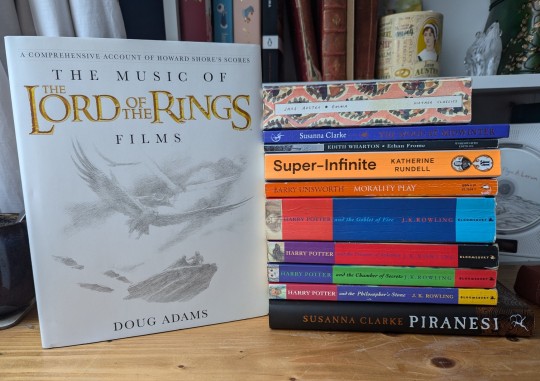
Still struggling to read consistently, mainly due to mental health and personal circumstances at the moment... But I have managed to finish some books over the last few months (although, I haven't finished anything this month yet 👀) and here they are:
August
Emma by Jane Austen - I have nothing left to say about this other than it's my favourite and I'm depressed so... 🤷♀️
Summer by Edith Wharton - I don't really remember this 3 months later but it was probably fine? I just remember thinking this hadn't aged very well
Piranesi by Susanna Clarke - I buddy read this with my best friend and I loved it even more the second time around.
Harry Potter 1 & 2 - depression set in and I listened to these in bed because I couldn't face anything else...
September
Harry Potter 3 & 4 - same as above
Morality Play by Barry Unsworth - objectively this book is excellent, not perfect but very good. The writing is superb, but I definitely read it at the wrong time and I didn't enjoy it as much as I should have done on paper.
October
The Music of the Lord of the Ring Films by Doug Adams - very mixed feelings about this one. I enjoyed experiencing it, but I do think Adams missed out on writing a more interesting book. The first quarter was fantastic analysis on Shore's score and how it related to the films and Tolkien's writing. The last three quarters is far too descriptive of what each track does... I kept thinking I could hear this for myself and I didn't really need to read someone spelling it out to me? But I might know too much about music for this one. I really do want to write about this book separately because I have a lot of thoughts.
Super-Infinite: the Transformations of John Donne by Katherine Rundell - this is a fun piece of nonfiction writing! It sort of fails as a biography of John Donne because Donne is so elusive in history as an individual (despite being a giant of early modern English literary history). However, it's a fantastic history of the intellectual circles of the late Elizabethan and Jacobean period! Seriously it's so good at introducing someone to this complex and bizarre world and I'd highly recommend it for that!
Ethan Frome by Edith Wharton - the book that taught me an excellent story can be ruined by ONE STUPID MOMENT...
The Wood at Midwinter by Susanna Clarke - the first miss for me from Clarke and you can read why here.
Still reading:
When Christ and His Saints Slept by Sharon Penman
Emma by Jane Austen (again)
Jonathan Strange and Mr Norrell by Susanna Clarke
#books of 2024#mini book reviews#august reads#september reads#october reads#I'm not tagging all of these#not proofread
2 notes
·
View notes